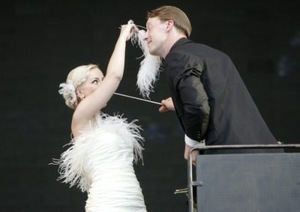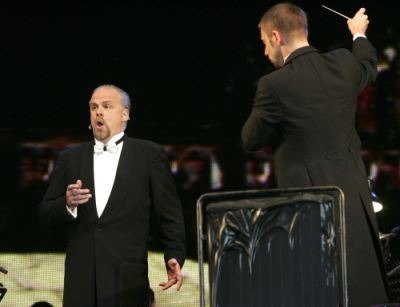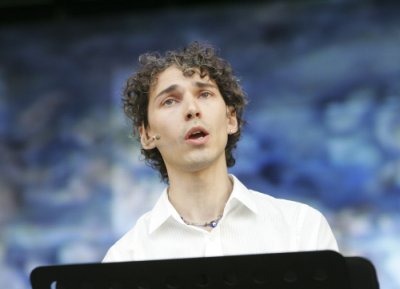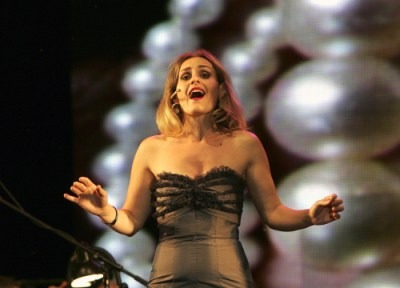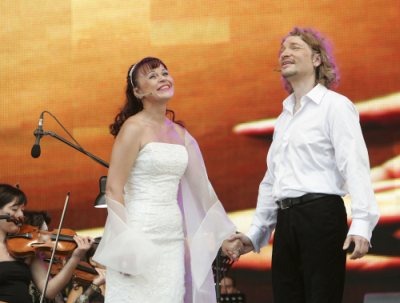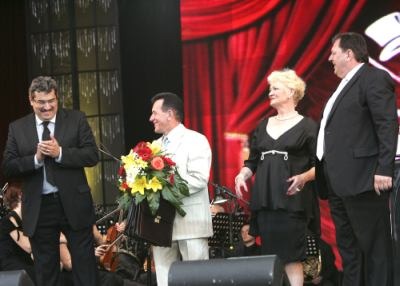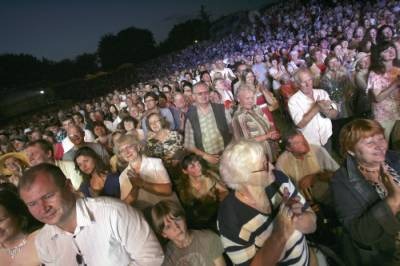“OPERETTA IN KAUNAS CASTLE”: FRENCH MUSIC FOR THE MASSES 0
Justina Paltanavičiūtė
www.kamane.lt , 2010 07 09
In brief: Admirers of free concerts of the 19th festival “Operetta in Kaunas Castle” flooded the approaches of Kaunas Castle on the 4th and 5th of July. This year the festival offered French music. Popular melodies from operas, operettas, musicals and cinema films resounded for two days. Several chansons replenished the programme.
Well-known performers loved by Lithuanian opera music admirers participated in the festival concerts: Liudas Mikalauskas, Edmundas Seilius, Kristina Zmailaitė, Raimondas Baranauskas, Virgilijus Noreika, and many others. Voices of guests of the festival could be heard too: the soloist of prestigious opera theatres bass Roman Polisadov from Latvia, the countertenor from Azerbaijan Aleksey Spirin, the lyric soprano from France Alketa Cela, Jelena Mirtova from Russia; also, the cellist Sergej Roldugin (Russia) performed. The soloists were assisted by the symphony orchestra of Russia and European countries headed by Julius Geniušas, who shared the baton with Jonas Janulevičius and a guest from Germany Bernhard Epstein. The concert announcers were the singer Ieva Vaznelytė and actor Gintaras Mikalauskas.
R.Polisadov
The concept of concerts of two days differed slightly. Arias from the most famous French composers’ operas and operettas were chosen for the first evening. The festival was started solemnly by an extract from the opera of G.Bizet “Carmen“ – the emotional composition is well-known to the majority of opera admirers. Later extracts from the most famous French operas resounded: the event could not be imagined without the most famous opuses of G. Offenbach and Ch. Gunot. Arias performed by famous soloists sounded diversely: lightly and solemnly while other performers lacked colours and emotions, which are so typical of Romantic music.
A.Spirin
A.Cela
In addition to opuses which have become popular classics, listeners had a chance to hear extracts from operas, in which psychological dramaturgy was more important (e.g., F. Halevy “The Jewess”, M. A. Charpentier cantata “David et Jonathas“, G. Masnet “Werther“). To tell the truth, fragments from such opuses that require great concentration did not correspond to the idea of the festival fully. The festival “Operetta in Kaunas Castle” reveals by its title that music pieces of lighter genre should sound at Kaunas Castle.
Lighter music of operettas, musicals, cinema films as well as chansons were performed on the second evening of the festival. Such music was most probably closer to the festival idea and the abundant audience. Many well-known music pieces were performed: fragments from the musical “Les Misérables” of Calude-Michel Schönberg, “Notre-dame de Paris” by Riccardo Cocciante, music from cinema films. The audience was charmed by the sensitive and impressive voice timbre of the soloist Edmundas Seilius. Songs from the repertoire of Edith Piaf performed by the actress Rasa Rapalytė became a strong accent of the programme.
Lithuanian soloists
If the festival "Operetta in Kaunas Castle" were to be evaluated as a phenomenon, it is evident that it is a good occasion to popularise classical music for the wide public. People who gather to free concerts feel free and unrestricted by the dress or behaviour code, they may be late to concerts or leave them when they want. On another hand, the festival is not a purely popular music event. It is rather a borderline festival: the manoeuvring between popular and serious culture is fashionable today; still, the masses rather than music gourmands are pleased in this way.
Another thing is evident: the festival “Operetta in Kaunas Castle” performs a certain educational mission. Not only guests but also composers not so well known to the wide public were presented during concerts. Also, announcers of the evening introduced some genres to the audience in a simple and understandable language (grand opera, for instance). This also testifies that the festival is targeted at amateur listeners rather than fastidious music admirers who are waiting for more serious and intellectual music opuses instead of well-sounding melodies.
Organisers of the festival
Joy of the audience
Finale
Photos by E.Butkevičius








